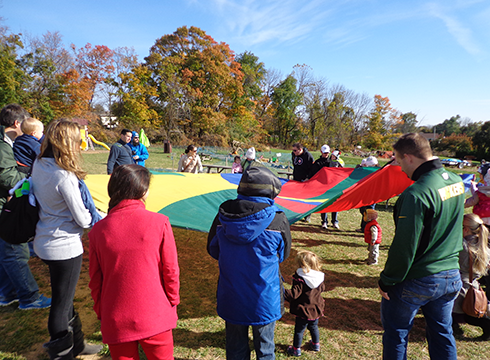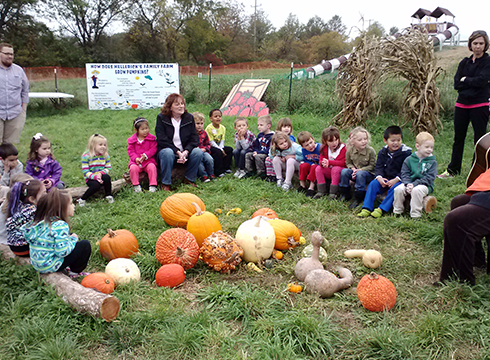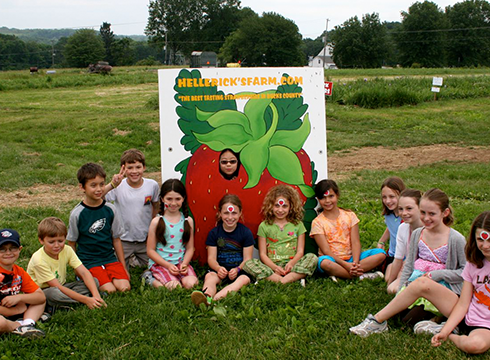Experiential Learning & Farm Education: Why Your Students Need to Visit Our Farm

In today’s fast-paced and technology-driven world, children’s connection to the natural world is fading. However, research underscores the transformative impact of early exposure to farm education, particularly through immersive field trips. From fostering a sense of responsibility and empathy to promoting physical activity and healthy eating habits, farm education provides a unique and invaluable learning experience for young minds. In this blog, we’ll explore why our farm visits and field trip experiences are powerful tools for enhancing early childhood development. Read on to learn more!
Why is farm education important?
Before we dive in, it’s important to understand what farm education is and how it benefits students. Farm education is important because it allows children to connect with nature and gain a deeper understanding of where their food comes from and how time in nature improves their lives.
We’ll start with food production because many children are disconnected from the process. When children only see food on the shelves of grocery stores, they misunderstand the plants, animals, and practices that make those meals possible. Farm education helps bridge this gap by giving children the opportunity to see firsthand how food is grown and produced. Engaging in hands-on activities at Hellerick’s Family Farm, such as the U-Pick Crop experience and Goat Experience, children develop a sense of responsibility and a connection to the land. This is an invaluable lesson for students of all ages, making them perfect activities for field trips in PA.
Moreover, farm education teaches children about the importance of sustainability and the interconnectedness of all living things. They learn that the food they eat comes from the earth and that it is essential to take care of the environment. They also learn more about farm animals through their personal interactions and gain an appreciation for fuzzy and feathery creatures. This understanding fosters a deep appreciation for nature and the environment, instilling a sense of stewardship and responsibility in young children.
The role of experiential learning in early childhood development
Farm education plays a crucial role in early childhood development, as it provides a holistic learning experience that encompasses various aspects of a child’s development. One of the key benefits of farm education is its ability to promote physical activity and healthy eating habits. Children who engage in farm-based activities during field trips in PA are more likely to be physically active! Hands-on involvement provided by farms like ours encourages children to be active and fosters a love for outdoor activities.
In addition to physical activity, farm education also nurtures cognitive development. When children participate in farm-related activities, they are exposed to problem-solving situations, which helps them develop critical thinking skills. For example, they may need to figure out the best way to navigate an obstacle course, how to climb a silo wall, or how to feed goats. These experiences encourage children to think creatively and develop problem-solving strategies at an early age.
Benefits of experiential learning for children

Farm education offers a wide range of benefits for children. One of the primary benefits is the development of life skills. By engaging in activities at our farm, children learn important skills such as teamwork, responsibility, and patience. They learn to work together with their peers, care for animals, and understand the importance of following instructions. These skills are not only valuable in the context of farm education but also in other areas of their lives.
Incorporating farm education into the early childhood curriculum
Integrating farm education into early childhood curriculum can be a valuable way to enhance children’s learning experiences. Teachers can incorporate farm themes into various subjects, such as science, math, and language arts. For example, in science, students can learn about plant growth and the life cycle of various farm animals. In math, they can practice counting and measuring using fruits and vegetables. In language arts, they can read books about farm life and write stories or poems inspired by their experiences.
Field trips to local farms in PA can easily be organized as part of the curriculum. These trips provide children with the opportunity to apply what they have learned in the classroom to real-life situations. They can interact with farmers, ask questions, and observe various farm activities. This hands-on experience deepens their understanding and allows them to make connections between what they have learned in the classroom and the real world.
Education resources and programs for early childhood educators
For early childhood educators looking to incorporate farm education into their curriculum, there are various resources and programs available. At Hellerick’s Family Farm, we invite schools to explore, engage, and learn in a captivating environment.
At our farm, educators can allow their students to partake in five exciting activities:
- Aerial Adventure Park – Education meets high ropes action as participants engage in an unforgettable aerial journey. With courses that traverse treetops and a grand 30-foot central tower, students and teachers alike embark on an adventure tailored to foster camaraderie and courage.
- Adventure Farm – Enhance your school’s curriculum with a dynamic field trip to Hellerick’s Adventure Farm. Perfect for preschoolers, elementary students, and community groups, our educational experiences provide valuable insights for children. Our engaging programs align with Pennsylvania Educational Standards and offer tailored content suitable for diverse age groups.
- Silo Climbing Wall – Immerse students in an adrenaline-pumping experience at our Silo Climbing Wall. This towering structure stands 35 feet tall and features varying levels of difficulty across its six sides. Equipped with the latest auto belay technology, every student can ascend to the pinnacle safely.
- Farm Obstacle Course – If your students crave adventure closer to the ground, our Farm Obstacle Course offers an exceptional experience. With “Roman Style” challenges like the Cliffhanger, Monkey Bars, and more, students engage in a variety of exciting obstacles
In addition to on-site programs, we encourage educators to explore online resources and educational materials. Websites, books, and videos provide educators with ideas for farm-related activities and lesson plans. These resources can be used to supplement classroom learning and provide children with a deeper understanding of farm life and the natural world.
The long-term benefits of farm education in early childhood development

In conclusion, farm education plays a vital role in early childhood development. It provides children with a unique and invaluable learning experience that fosters a sense of responsibility, empathy, and connection to the natural world. Through hands-on activities and exposure to farm life, children develop essential life skills, problem-solving abilities, and critical thinking skills. Additionally, farm education promotes physical activity, healthy eating habits, and a deep appreciation for nature and the environment. By integrating farm education into early childhood curriculum and providing access to farm-based learning experiences, school groups can nurture well-rounded individuals who are connected to their roots and equipped to make a positive impact on the world. If you’re ready to take your students on a journey they’ll never forget, contact us to plan your next field trip!
